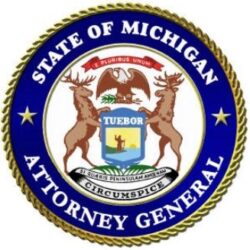
Media Contact: Ryan Jarvi FOR IMMEDIATE RELEASE: AG Nessel Joins Effort to Strengthen Federal Consumer Protections For Funeral Home Services22 Attorneys General Urge FTC to Update Funeral Industry Rules to Increase Pricing Transparency Online and Safeguard Consumer Funds from Misuse and Fraud LANSING — Michigan Attorney General Dana Nessel recently joined a coalition of 22 attorneys general calling on the Federal Trade Commission (FTC) to enhance consumer protections around funeral home services. In a comment letter to the FTC about its 1982 Funeral Industry Practices Rule, the attorneys general warn that insufficient pricing transparency in the funeral industry inhibits consumers from accurate comparison shopping and exposes them to being overcharged. The coalition is calling on the FTC to require funeral service providers to standardize pricing disclosures and safeguard against the misuse of funds consumers pay to funeral homes in advance of a funeral. As deaths from coronavirus disease 2019 (COVID-19) rise, Nessel and her colleagues urge the FTC to better shield bereaved families nationwide from unknowingly overpaying for funeral services. “The devastating reality right now for thousands of people here in Michigan and across this nation is bearing the responsibility of ensuring their loved ones are laid to rest properly and respectfully,” said Nessel. “The last thing they should have to worry about as they mourn is whether they’re being treated fairly financially. That’s why my colleagues and I are calling on the FTC to improve transparency of the funeral service industry so family members and friends can grieve without the worry of being ripped off.” The current version of the FTC’s funeral rule – which regulates funeral homes – requires funeral providers to give up-front itemized price information along with explanations for those prices, though there is no standardized format providers must follow to offer easy price comparison for consumers. The rule also allows consumers to use caskets purchased elsewhere at no added expense, to pay for only the goods and services they want and need, and offers some protections from misrepresentations around services such as embalming. However, it does not require providers to post this information online or offer consumers context around average funeral costs. The rule also leaves consumers paying for services in advance, such as through a life insurance policy, vulnerable to overpayment or fraud. In their letter, the AGs urge the FTC to strengthen protections for consumers by requiring funeral providers to:
Nessel joins the attorneys general of Arizona, California, Colorado, Connecticut, Delaware, the District of Columbia, Hawaii, Iowa, Maine, Maryland, Minnesota, Nevada, New Jersey, New Mexico, New York, North Carolina, Oregon, Pennsylvania, Rhode Island, Virginia, and Wisconsin in submitting this letter. |

